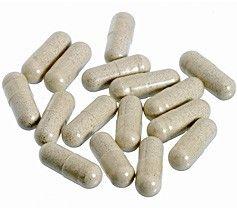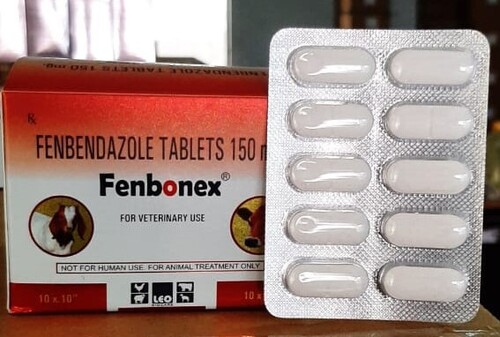fenbendazole capsules: What to Expect Before and After Treatment
All You Need to Find Out About Fenbendazole and Its Utilizes in Animal Treatment Solutions
Fenbendazole is a commonly acknowledged anthelmintic medicine in veterinary care. It effectively targets different gastrointestinal parasites in animals. Recognizing its mechanism and proper applications is essential for animal owners. This medicine offers noteworthy advantages yet likewise needs careful dosage and tracking. As family pet treatment evolves, exploring fenbendazole's duty can give understandings right into preserving suitable wellness for precious animals. What should pet owners find out about its management and safety?
What Is Fenbendazole?
Fenbendazole is an anthelmintic medicine primarily utilized to deal with parasitical infections in animals. This broad-spectrum dewormer is effective against a selection of stomach bloodsuckers, including roundworms, hookworms, whipworms, and specific sorts of tapeworms. It is typically used in pet dogs, pet cats, steeds, and livestock, making it a versatile option for pet dog proprietors and veterinarians alike. Fenbendazole is generally administered by mouth, readily available in numerous formulas such as granules, tablets, or suspensions. The drug is usually taken into consideration risk-free, with a reduced occurrence of side effects, although it is crucial for pet dog proprietors to adhere to dosage instructions very carefully. By removing parasitical infections, fenbendazole aids keep total health and wellness in family pets, guaranteeing they stay energetic and dynamic. Its effectiveness and safety and security account have added to its prevalent use in veterinary method, establishing fenbendazole as a keystone in animal treatment options.

Exactly How Does Fenbendazole Work?
Targeting bloodsuckers at a cellular degree, fenbendazole interrupts their metabolic procedures. This anthelmintic drug mostly hinders the feature of microtubules, important elements of the parasite's cellular framework. By binding to tubulin, a protein that creates microtubules, fenbendazole stops the setting up of these frameworks, which are crucial for various mobile functions, consisting of transportation and division. Consequently, the influenced bloodsuckers are not able to maintain their life cycle, resulting in their eventual fatality.
Fenbendazole additionally disrupts power production in parasites by preventing the enzyme fumarate reductase, crucial for their metabolism. This double activity not just restrains their ability to reproduce however additionally jeopardizes their energy supply, additional improving its efficacy. In general, fenbendazole's targeted device enables for effective control of a wide spectrum of parasitic infections, making it a beneficial tool in vet medication for the therapy of infested animals.
Typical Uses of Fenbendazole in Pet Care
In the domain name of veterinary medicine, fenbendazole is commonly made use of for its effectiveness against a variety of parasitical infections in pet dogs. This broad-spectrum anthelmintic is primarily utilized to treat gastrointestinal bloodsuckers such as roundworms, hookworms, whipworms, and tapeworms. Fenbendazole is also reliable versus certain protozoan infections, consisting of giardiasis.
Veterinarians usually suggest fenbendazole for regular deworming in pups and kittens, provided their vulnerability to these bloodsuckers. In addition, it is used in grown-up pets and cats as part of a complete parasite control program.
Fenbendazole is favored for its safety and security account, making it ideal for usage in various breeds and ages of family pets. It is generally administered in oral type, via granules or tablet computers, enabling easy consolidation right into a pet dog's diet regimen. Normal use fenbendazole adds to maintaining overall health and wellness and wellness in pet dogs by preventing and handling parasitical infections effectively.
Advantages of Fenbendazole for Pet dogs
Fenbendazole offers significant advantages for family pets, specifically as an efficient treatment for numerous parasitic infections. Its security profile makes it appropriate for a variety of pets, making certain that both pet dogs and felines can take advantage of its usage without considerable risk. This mix of efficacy and safety and security positions fenbendazole as a beneficial alternative in pet care.
Effective Parasite Treatment
Numerous pet proprietors seek effective options for bloodsucker invasions, and fenbendazole has actually emerged as a trusted option. This broad-spectrum anthelmintic drug targets different internal bloodsuckers, including roundworms, hookworms, and whipworms. Fenbendazole interrupts the basal metabolism of these parasites, causing their removal from the pet's system. Its effectiveness is significant throughout various varieties, making it a versatile choice for lots of pet proprietors - fenbendazole. Furthermore, fenbendazole is typically well-tolerated, with see here marginal side results reported, which boosts its appeal as a therapy option. Normal use fenbendazole can assist keep a pet dog's health and comfort by preventing the complications linked with parasitic infections. On the whole, fenbendazole stands out as a valuable tool in the battle against typical bloodsuckers in animals
Safe for Numerous Animals

Dose and Management Guidelines
When thinking about fenbendazole for family pets, understanding the correct dosage is important for effectiveness and safety and security. Advised dosage guidelines differ based on the type of animal and the details problem being treated. Additionally, different management techniques can influence the general success of the therapy.
Advised Dosage Guidelines
Although fenbendazole is a widely used anthelmintic in veterinary medicine, developing the proper dosage for family pets is crucial to guarantee both effectiveness and security. The recommended dose normally differs based upon the kind of parasite being treated and the pet's weight. For pets and felines, a common guideline recommends administering 50 mg per kilo of body weight daily for three consecutive days. Nevertheless, in some cases, a veterinarian may suggest a much longer treatment duration or change the dosage based on individual wellness conditions (fenbendazole 444). It is necessary for family pet owners to seek advice from a vet before providing fenbendazole, as unacceptable does may lead to inadequate therapy or possible side results, highlighting the relevance of specialist guidance in family pet treatment


Management Approaches Explained
Carrying out fenbendazole to pet dogs calls for cautious consideration of the approach to assure optimal absorption and efficiency. The most common administration techniques consist of dental formulations, such as tablet computers or suspensions. Tablet computers ought to be given entire, while suspensions should be drunk well before usage. For family pets that are hard to medicate, blending fenbendazole with a percentage of food can linked here improve approval. Dosing typically depends upon the pet dog's weight and the particular condition being dealt with. It is essential to comply with veterinarian referrals very closely and complete the complete training course of treatment, also if signs and symptoms improve. Keeping an eye on for adverse effects is likewise important, as negative responses can occur, albeit rarely. Appropriate administration guarantees the drug's efficiency and the pet's health and wellness.
Safety Considerations and Prospective Negative Effects
While fenbendazole is widely acknowledged for its effectiveness in treating various parasitic infections in pets, it is vital to assess the safety and security profile and potential adverse effects associated with its use. Normally, fenbendazole is thought about risk-free when provided at advised dosages, however some family pets may experience adverse reactions. Common adverse effects consist of intestinal disturbances such as throwing up and looseness of the bowels, as well as sleepiness or loss of cravings.
In rare situations, allergies might take place, leading to signs like swelling or problem breathing (222 mg). It is important for pet dog proprietors to monitor their animals carefully during treatment and report any unusual actions to a vet. In addition, fenbendazole needs to not be made use of in pet dogs with recognized hypersensitivity to the medicine or in expecting animals unless specifically suggested by a vet. In general, educated use and veterinary guidance can assist minimize dangers connected with fenbendazole treatment in pets
Frequently Asked Concerns
Is Fenbendazole Safe for Expectant Animals?
The safety and security of fenbendazole for pregnant pet dogs remains vague. Some studies recommend prospective threats, while others indicate it may be secure. Consultation with a veterinarian is important to weblink assure the wellness of both the mother and her offspring.
Can Fenbendazole Be Used for Cats?
Fenbendazole can be used for cats, largely to deal with specific kinds of parasitic infections. It is crucial for family pet owners to speak with a vet for ideal dosage and safety guidelines certain to their pet cat's health and wellness.
How Much Time Does Fenbendazole Take to Work?
The time it takes for fenbendazole to work commonly ranges from a couple of days to a week, depending upon the specific condition being dealt with and the private animal's reaction to the medicine. Regular application is essential.
Are There Any type of Communications With Various Other Medications?
Potential interactions with various other drugs need to be meticulously considered when administering fenbendazole. Consulting a vet is vital to assure safe combinations, as particular medicines might change its effectiveness or boost the threat of negative effects in pet dogs.
Where Can I Purchase Fenbendazole for Animals?
Fenbendazole for pets can be purchased at vet centers, animal supply shops, and online sellers. It is necessary to guarantee the item is specifically formulated for pets to verify security and efficiency in therapy.